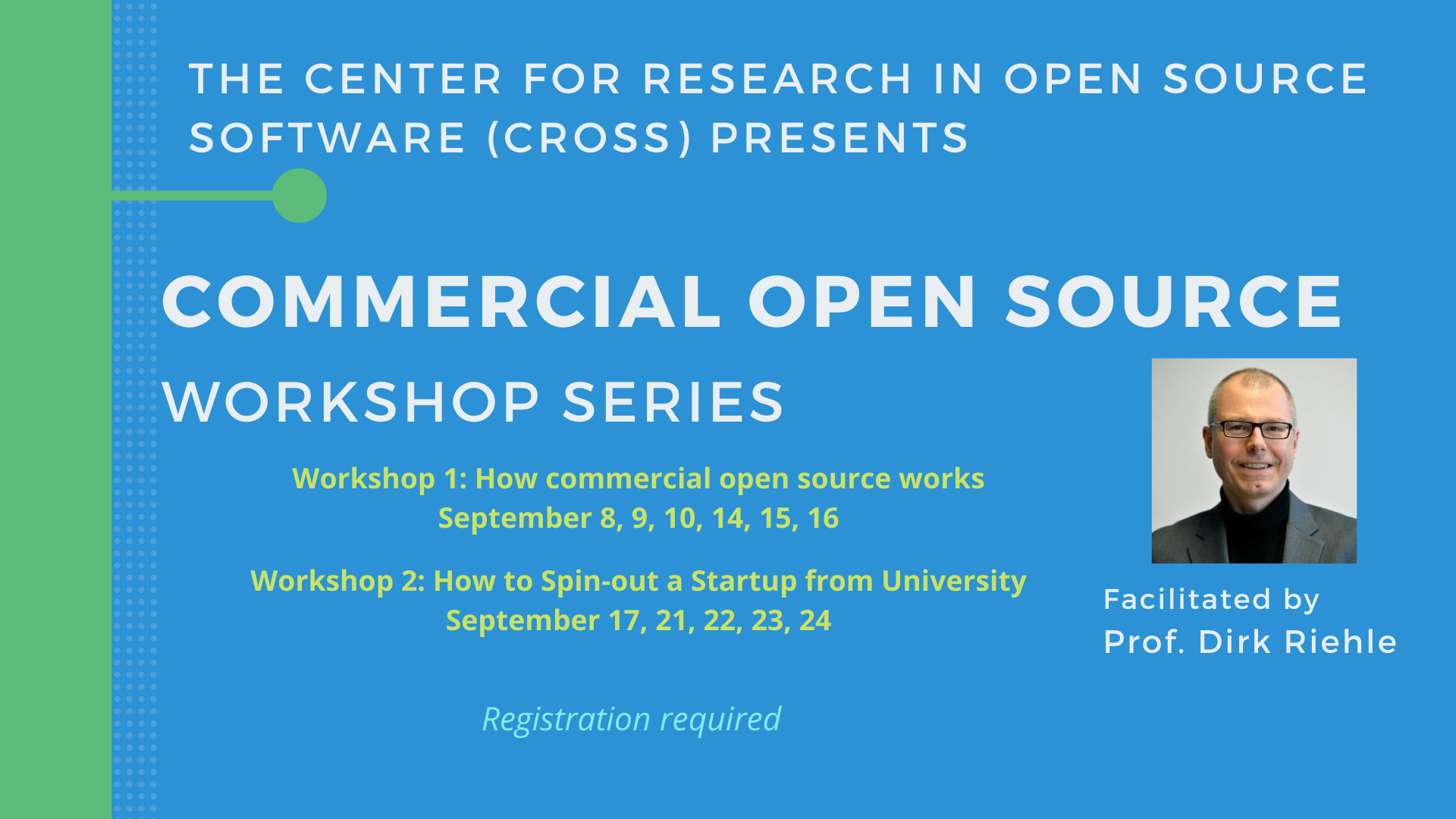Commercial Open Source Workshop Series
Registration for CROSS Members and UCSC Student/Faculty/Staff
Registration information for all other participant
In September 2020, CROSS is pleased to be hosting a workshop series facilitated by CROSS visiting researcher Dr. Dirk Riehle, Professor of Open Source Software at the Friedrich-Alexander University Erlangen-Nürnberg. Professor Rielhe will hold two multi-session workshops (11 sessions in total); the first workshop runs from September 8-16 and second workshop runs from September 17-24. Each session will include a 45 to 60 minutes lecture followed by Q&A.
Workshop Topics
Workshop 1: How Commerical Open Source Works
Workshop 2: How to Spin-out a Startup from University
Registration
Registration is required to participate and registered participants will have access to recorded sessions for up to one-month after the workshop ends. Zoom links for each workshop will be emailed to participants after registration.
Registration for CROSS and UCSC affiliates (No cost)
Registration for non-affiliated participants
About the Instructor:
Prof. Dr. Dirk Riehle, M.B.A., is the Professor of Open Source Software at the Friedrich-Alexander University Erlangen-Nürnberg. Before joining academia, Riehle led the Open Source Research Group at SAP Labs, LLC, in Palo Alto, California (Silicon Valley). He works on open source and inner source software engineering as well as agile software development methods and continuous delivery. Prof. Riehle holds a Ph.D. in computer science from ETH Zürich and an M.B.A. from Stanford Graduate School of Business. He welcomes email at dirk@riehle.org, blogs at https://dirkriehle.com, and tweets as @dirkriehle.
Workshop Outlines
Commercial Open Source Workshop 1: How Commercial Open Source Works
Summary
This series of workshops (combined lecture with discussion) introduces participants to the software industry, open source software, and then specifically commercial open source software strategies.
Audience
Graduate students and professionals interested in learning more about open source opportunities.
Session Schedule
|
SESSION |
DATE |
TIME |
TITLE |
|
1 |
2020-09-08 |
9:00am PDT |
The Software Industry |
|
2 |
2020-09-09 |
9:00am PDT |
Software Products |
|
3 |
2020-09-10 |
9:00am PDT |
Software Vendors |
|
4 |
2020-09-14 |
9:00am PDT |
Open Source Software |
|
5 |
2020-09-15 |
9:00am PDT |
Open Source Projects |
|
6 |
2020-09-16 |
9:00am PDT |
Community Management |
Session Content
Session 1: The Software Industry
|
Session 2: Software Products
|
|
Session 3: Software Vendors
|
Session 4: Open Source Software
|
|
Session 5: Open Source Projects
|
Session 6: Community Management
|
Commercial Open Source Workshop 2: How to Spin-out a Startup from University
Summary
This series of workshops (combined lecture with discussion) introduces students to how software startups work and how to turn an academic software project into a commercial startup.
Audience
Entrepreneurial students, engineering students, ideally (but not necessarily) with an existing software project, and professionals interested in learning more about open source opportunities.
Session Schedule
|
SESSION |
DATE |
TIME |
TITLE |
|
1 |
2020-09-17 |
9:00am PDT |
Commercial Open Source |
|
2 |
2020-09-21 |
9:00am PDT |
Product Management |
|
3 |
2020-09-22 |
9:00am PDT |
Software Startups |
|
4 |
2020-09-23 |
9:00am PDT |
University spin-offs |
|
5 |
2020-09-24 |
9:00am PDT |
The funding ecosystem |
Session Content
|
Session 1: Commercial Open Source
|
Session 2: Product Management
|
|
Session 3: Software Startups
|
Session 4: University Spin-offs
|
|
Session 5: The Funding Ecosystem
|
Special thanks to our supporter Flash Memory Summit


